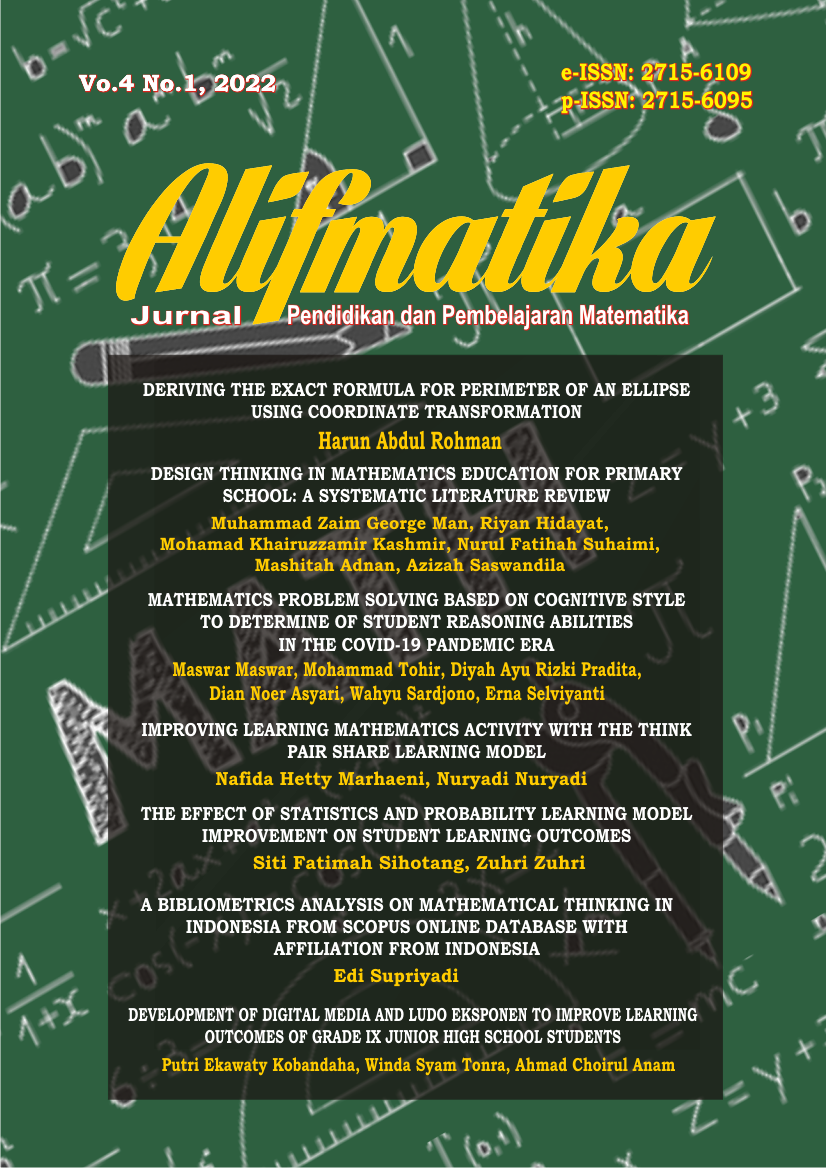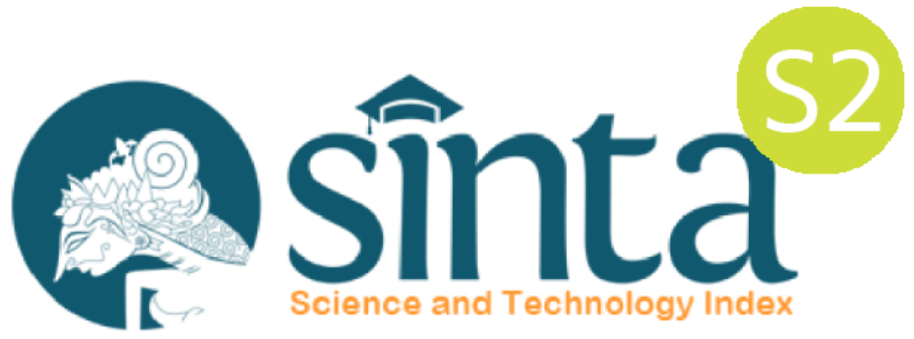MATHEMATICS PROBLEM SOLVING BASED ON COGNITIVE STYLE TO DETERMINE OF STUDENT REASONING ABILITIES IN THE COVID-19 PANDEMIC ERA
DOI:
https://doi.org/10.35316/alifmatika.2022.v4i1.37-51Keywords:
Problem Solving, Cognitive Style, Student Reasoning Abilities, Algebra, Pandemic EraAbstract
Mathematical problem solving has become an important issue that was often discussed in school classes including in the covid-19 pandemic era. This research aimed to describe the level of reasoning ability of students in solving mathematical problems based on the cognitive style of field-dependent and field-independent cognitive styles. The research approach used a was mixed-method of quantitative and qualitative. The subject of this study were students of Ibrahimy 1 Junior High School of Situbondo. The data collection techniques used were the form of tests and interviews. The data of the written test and interview results were tested for validity by triangulation. This research indicated that:(1) there were differences in student’s mathematical reasoning abilities between-FD and FI subjects; (2) the FI subject was able to re-examined, evaluated, and drew valid conclusions, but not for FD subject; (3) the FI subject has fulfilled all four mathematics reasoning indicators and classified as a very capable category; (4) the FD subject has fulfilled all three indicators and classified as capable enough category; and (5) generally, the level of mathematical reasoning ability of FI subjects group was very capable category as many as 21,43% and 14,29 % for FD subjects group.
Downloads
References
Al Jabbar, Z. L., Hadi, A. F., Wangguway, Y., & Sulistiyono, B. (2020). The analysis of problem-based learning implementation and its effect on students creative innovative skills in solving rainbow antimagic coloring based on cognitive style. Journal of Physics: Conference Series, 1538(1), 12089. https://doi.org/10.1088/1742-6596/1538/1/012089
Annur, M. F., Sujadi, I., & Subanti, S. (2016). Aktivitas Metakognisi Siswa Kelas X SMAN 1 Tembilahan dalam Pemecahan Masalahan Matematika Ditinjau dari Gaya Kognitif. Jurnal Pembelajaran Matematika, 4(7), 720-730. https://jurnal.fkip.uns.ac.id/index.php/s2math/article/view/9176
Erviana, T. (2019a). Kemampuan Penalaran Matematis Siswa dalam Memecahkan Masalah Aljabar Berdasarkan Gaya Kognitif Field Independent. Alifmatika: Jurnal Pendidikan Dan Pembelajaran Matematika, 1(1), 61–73. https://doi.org/10.35316/alifmatika.2019.v1i1.61-73
Erviana, T. (2019b). Penalaran Siswa SMP dengan Gaya Kognitif Field Dependent dalam Memecahkan Masalah Aljabar. Prosiding Silogisme, 1(1). http://prosiding.unipma.ac.id/index.php/PSNPM/article/view/624
Khoiriyah, N. (2013). Analisis Tingkat Berpikir Siswa Berdasarkan Teori Van Hiele pada Materi Dimensi Tiga Ditinjau dari Gaya Kognitif Field Dependent Dan Field Independent (Penelitian Dilakukan di SMA Negeri 1 Mojolaban Kelas X Tahun Ajaran 2011/2012). https://digilib.uns.ac.id/dokumen/detail/29449
Maswar. (2019). Strategi Pembelajaran Matematika Menyenangkan Siswa (Mms) Berbasis Metode Permainan Mathemagic, Teka-Teki Dan Cerita Matematis. Alifmatika: Jurnal Pendidikan Dan Pembelajaran Matematika, 1(1), 28–43. https://doi.org/10.35316/alifmatika.2019.v1i1.28-43
Mirlanda, E. P., & Pujiastuti, H. (2018). Kemampuan penalaran matematis: analisis berdasarkan gaya kognitif siswa. Symmetry: Pasundan Journal of Research in Mathematics Learning and Education, 3(2), 56–67. http://dx.doi.org/10.23969/symmetry.v3i2.1251
Munawwarah, M., Laili, N., & Tohir, M. (2020). Keterampilan Berpikir Kritis Mahasiswa dalam Memecahkan Masalah Matematika Berdasarkan Keterampilan Abad 21. Alifmatika: Jurnal Pendidikan Dan Pembelajaran Matematika, 2(1), 37–58. https://doi.org/10.35316/alifmatika.2020.v2i1.37-58
Ngilawajan, D. A. (2013). Proses berpikir siswa SMA dalam memecahkan masalah matematika materi turunan ditinjau dari gaya kognitif field independent dan field dependent. PEDAGOGIA: Jurnal Pendidikan, 2(1), 71–83. https://doi.org/10.21070/pedagogia.v2i1.48
Nugraha, M. G., & Awalliyah, S. (2016). Analisis Gaya Kognitif Field Dependent Dan Field Independent Terhadap Penguasaan Konsep Fisika Siswa Kelas VII. V, SNF2016-EER-71-SNF2016-EER-76. https://doi.org/10.21009/0305010312
Sardjono, W., Selviyanti, E., Mukhlis, M., & Tohir, M. (2021). Global issues: utilization of e-commerce and increased use of mobile commerce application as a result of the covid-19 pandemic. Journal of Physics: Conference Series, 1832(1), 12024. https://doi.org/10.1088/1742-6596/1832/1/012024
Sardjono, W., Selviyanti, E., Tohir, M., & Azizah, R. (2021). The effect of the Covid 19 pandemic on the development of the knowledge graph as an integrated recovery accelerator. Journal of Physics: Conference Series, 1832(1), 12021. https://doi.org/10.1088/1742-6596/1832/1/012021
Selviyanti, E., Sardjono, W., Mukhlis, M., Tohir, M., Maswar, M., & Fariz, A. (2021). Model of developing key performance indicator to increase the quality of education during the Covid-19 pandemic. Journal of Physics: Conference Series, 1832(1), 12030. https://doi.org/10.1088/1742-6596/1832/1/012030
Siagian, M. D. (2016). Kemampuan koneksi matematik dalam pembelajaran matematika. MES: Journal of Mathematics Education and Science, 2(1), 58–67. https://doi.org/10.30743/mes.v2i1.117
Suprihatiningsih, S. (2015). Penalaran Matematis Siswa dalam Pemecahan Masalah Pada Materi Pokok Faktorisasi Bentuk Aljabar di Kelas VIII SMP Negeri 1 Surakarta. Prosiding Seminar Nasional Matematika Dan Pendidikan Matematika UMS, 157–163. Universitas Muhammadiyah Surakarta. http://hdl.handle.net/11617/5992
Taufik, A. R., & Zainab, N. (2021). Mathematical literacy of students in solving PISA-like problems based on cognitive styles of field-dependent and field-independent. Journal of Physics: Conference Series, 1918(4), 042080. https://doi.org/10.1088/1742-6596/1918/4/042080
Thalhah, S. Z., Tohir, M., Nguyen, P. T., Shankar, K., & Rahim, R. (2019). Mathematical Issues in Data Science and Applications for Health care. International Journal of Recent Technology and Engineering, 8(2S11), 4153–4156. https://doi.org/10.35940/ijrte.B1599.0982S1119
Tohir, M., Atikurrahman, M., Maswar, M., Daulay, L. A., Minhaji, M., Albadri, A., & Sardjono, W. (2021). Building a caring community in problem based learning to improve students’ mathematical connection capabilities. Journal of Physics: Conference Series, 1839(1), 12008. https://doi.org/10.1088/1742-6596/1839/1/012008
Tohir, M. (2017). Pengembangan Bahan Ajar Olimpiade Matematika Berdasarkan Model Pemecahan Masalah untuk Meningkatkan Kemampuan Penalaran Matematis Siswa. In Tesis. Magister Pendidikan Matematika Universitas Jember. https://doi.org/10.13140/RG.2.2.31121.79200
Tohir, M., Abidin, Z., Dafik, D., & Hobri, H. (2018). Students Creative Thinking Skills in Solving Two Dimensional Arithmetic Series Through Research-Based Learning. Journal of Physics: Conference Series, 1008(1), 012072. https://doi.org/10.1088/1742-6596/1008/1/012072
Tohir, M., Maswar, M., Atikurrahman, M., Saiful, S., & Rizki Pradita, D. A. (2020). Prospective teachers’ expectations of students’ mathematical thinking processes in solving problems. European Journal of Educational Research, 9(4), 1735–1748. https://doi.org/10.12973/EU-JER.9.4.1735
Tohir, M., & Muhasshanah, M. (2021). Mathematical Issues in Two-Dimensional Arithmetic for Analyze Students’ Metacognition and Creative Thinking Skills. Alifmatika: Jurnal Pendidikan Dan Pembelajaran Matematika, 3(2), 170–183. https://doi.org/10.35316/alifmatika.2021.v3i2.170-183
Tohir, M., Susanto, Hobri, Suharto, & Dafik. (2018). Students’ Creative Thinking Skills in Solving Mathematics Olympiad Problems Based on Problem-Solving Polya and Krulik-Rudnick Model. Advanced Science Letters, 24(11), 8361–8364. https://doi.org/10.1166/asl.2018.12563
Yezli, S., & Khan, A. (2020). COVID-19 social distancing in the Kingdom of Saudi Arabia: Bold measures in the face of political, economic, social and religious challenges. Travel Medicine and Infectious Disease, 37(1), 1–4. https://doi.org/10.1016/j.tmaid.2020.101692
Downloads
Published
How to Cite
Issue
Section
License
COPYRIGHT NOTICE
Author (s) who publish in Alifmatika: Jurnal Pendidikan dan Pembelajaran Matematika agree to the following terms:
- The Author (s) submitting a manuscript do so on the understanding that if accepted for publication, copyright of the article shall be assigned to Alifmatika: Jurnal Pendidikan dan Pembelajaran Matematika, Tarbiyah Faculty of Ibrahimy University as the publisher of the journal. Consecutively, author(s) still retain some rights to use and share their own published articles without written permission from Alifmatika: Jurnal Pendidikan dan Pembelajaran Matematika. This work is licensed under a Creative Commons Attribution-ShareAlike 4.0 International License.
- Copyright encompasses rights to publish and provide the manuscripts in all forms and media for the purpose of publication and dissemination, and the authority to enforce the rights in the manuscript, for example in the case of plagiarism or in copyright infringement.
- Alifmatika: Jurnal Pendidikan dan Pembelajaran Matematika and the Editors make every effort to ensure that no wrong or misleading data, opinions or statements be published in the journal. In any way, the contents of the articles and advertisements published in Alifmatika: Jurnal Pendidikan dan Pembelajaran Matematika are the sole responsibility of their respective authors and advertisers.
- The Copyright Transfer Form can be downloaded here [Copyright Transfer Form Alifmatika]. The copyright form should be signed originally and send to the Editorial Office in the form of original mail, scanned document to alifmatika[at]ibrahimy.ac.id or upload the scanned document in the comments column when sending the manuscript.























_by_Matematohir.jpg)






